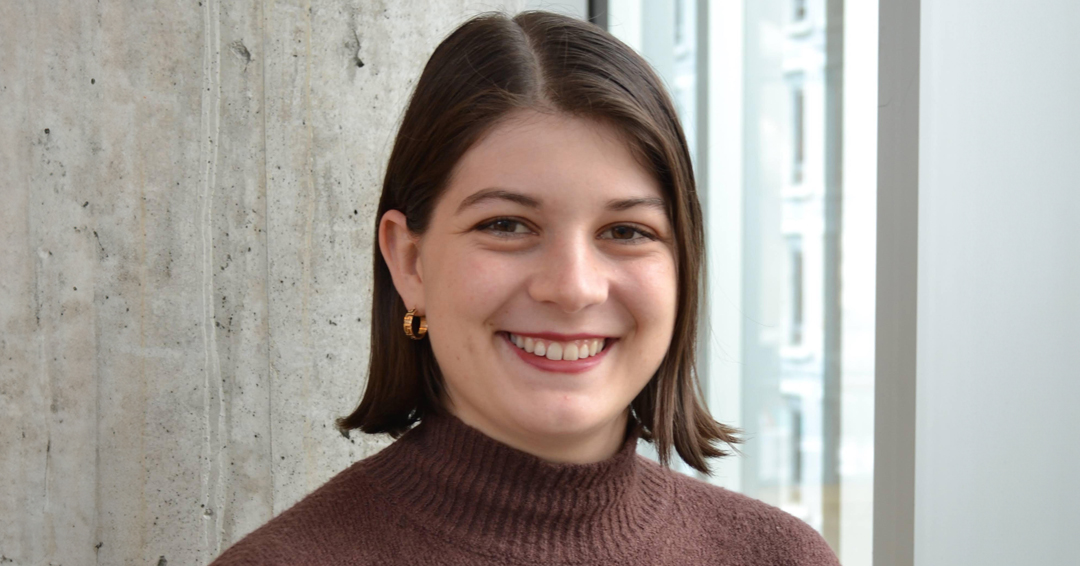
Part of our series: FMHS community members from away – The Faculty of Medicine and Health Sciences (FMHS) is made up of diverse communities, including people from across Canada and around the world. This series recognizes those from outside the province who have chosen to bring their talents and expertise to McGill University. Thank you for all that you contribute!
While physiotherapist Stephanie Molloy spends her time helping patients recover from injury at Montreal’s Jewish General Hospital and Action Sport Physio, a sports medicine clinic, the notion of social justice guides her overall approach to her profession.
“I’ve always been very passionate about social justice. When I was at the University of Manitoba, I volunteered with the World University Service of Canada, which sponsors refugees to get post-secondary education in Canada. In my first year at McGill, a professor approached me about creating social media to help build support around their Zoom presentation at the World Physiotherapy Congress, on decolonization, a tenet that rejects conventional attitudes toward economic, social, and political policies considered oppressive,” Molloy says.
Molloy graduated with a Master of Science (Applied) in Physiotherapy from McGill University in 2022, and found two positions where she applies her expertise. “I work at the Jewish General Hospital three days a week and I work at Action Sport Clinic two days a week. At the hospital, I usually work with my colleagues on the orthopedic floor. On this ward, I work with two other physiotherapists and a physiotherapy technologist, so we always ensure the patients are divided evenly between us. We start the day with morning rounds with the whole healthcare team to discuss all the patients and their plans. After this we plan our day with the nurses and get to treating the patients.”
For the sports clinic, Molloy works two appointment-based eight-hour days. “It varies depending on how many patients I have. Patient follow-up is 30 minutes and an evaluation is an hour.”
Molloy promotes equity and justice within healthcare and rehabilitation through Justice Centered Rehab, an organization that shares progressive messages and lists events in the sphere of rehabilitation. Its mission statement is “to influence a justice-centered focus in relevant organizations and groups to encourage justice within their practice and policies with the goal of increasing harmony and equity in society.
“It’s a largely informal organization. We interact and publish on Twitter, Instagram, and Facebook, and we have a blog and our website. In addition to summarizing current physio and occupational research on those platforms, we organize events, raise awareness, and post articles,” Molloy said.
The organization contends the healthcare system in general in Canada, especially in physiotherapy, has its impediments and shortcomings. “Basically, it’s not a very good system. It was built on the precepts of colonization. Even our profession was developed through the oppression of other peoples and professions, whether they were formal or informal. Canada’s entire healthcare system is a colonial construct, which is exemplified by its disproportionate delivery of services, for instance within Indigenous communities,” Molloy adds.
In addition to traditional physiotherapy modalities such as exercise and manual therapy, Molloy includes mindfulness techniques in her treatment regimen. “With my bachelor’s degree in psychology, I’ve found there is an intersection between psychology and physiotherapy. And there’s a huge component concerning pain and psychology. The mental aspect is interwoven in many of the disorders themselves. There’s so much work that physiotherapy can do with that. From looking into the field, I found that mindfulness is a good way of bringing mental health and physical health together. I ask my patients questions about their sleep habits and their big stressors because that’s really important with pain and pain perception.”
Pain perception is the notion that pain is not an objective experience. Rather, it is subjective, based on the individual’s psychological disposition. Therefore, everybody’s pain is different. For example, being under a lot of stress can make pain feel more severe. Social isolation may add to the experience of pain and decrease pain tolerance. Previous experiences of pain can also influence pain tolerance.
“If you had a great sleep, it’s your happiest day ever. When it’s sunny out and you stub your toe, you might barely notice it. So, your perception of pain, even though it’s the same amount of tissue damage to your body, is influenced by an amalgam of brain signals. That’s why emotional regulation and the like is so important, because if you fix someone’s injury but they’re still always super stressed out and super anxious, it’s more than likely the pain is just going to come back even if they’re doing all the exercises right,” Molloy explains.
Having acquired a proficiency in French in school, and by working for Parks Canada, Molloy has become bilingual. “When I came here and I had to augment my French with healthcare-specific lexicon. It’s certainly improved since I’ve been in Montreal.”
Gainfully employed and having developed a sense of community, her Montreal residence is more or less permanent, Molloy says. “A lot of my friends from university stayed and there’s so much to do. It’s such a great city.”
